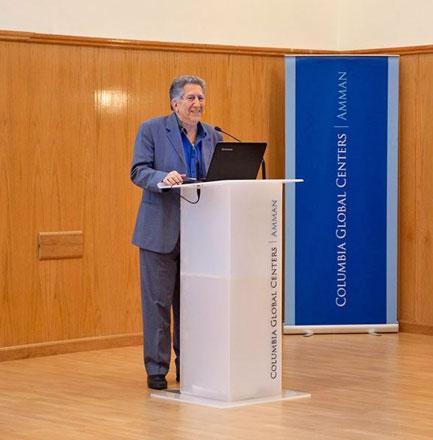You are here
Historian’s new book questions enduring legacy of colonialism in Middle East
By Saeb Rawashdeh - Apr 16,2019 - Last updated at Apr 16,2019

Professor Fawwaz Traboulsi addresses the audience, at the Columbia Global Centres, during a presentation of his book, on Thursday (Photo courtesy of the Columbia Global Centres)
AMMAN — Historian Fawwaz Traboulsi recently detailed the underlining theme of his new book questioning the historical significance of the Sykes-Picot Agreement and Balfour Declaration.
His book published this year: “Sykes-Picot-Balfour: Beyond the Maps”, was influenced by the centennial of the Sykes-Picot Agreement and Balfour Declaration, and by a debate raised about both events.
“We have this habit of linking what happened in the past and with what’s happening now. I wrote this book under the impact of the anniversaries of Sykes-Picot and Balfour, and also under how these anniversaries were treated with Daesh declaring that it broke Sykes-Picot frontiers,” Traboulsi said last week at Columbia Global Centres in Amman.
The scholar said, the anniversary opened a series of discussions in Arabic and foreign press concerning Sykes-Picot. “The idea was: is it [currently] the end of that agreement and the beginning of new geopolitical arrangements?”
However, maps of the Middle East were quite stable with the exception of 1948 (the creation of Israel), the historian said. Frontiers that were consecrated by the three powers, the US, the UK and France, were quite solid and respected, he noted, adding that his book was essentially a look at history, while noting at the same time there were very few books in Arabic about that period.
The general public takes for granted a few things about the Sykes-Picot Agreement: that it was a secret treaty, first between three states — the UK, France and Russia, when a large part of Turkey was projected to be seized by the Russian Empire, and later after the October Revolution, by the UK, the US and France, Traboulsi explained
“Second what we now call Palestine was divided into two regions — Palestine and Transjordan, Haifa and Accra were small British enclaves, while Jerusalem should have become an international zone run by these three empires,” Traboulsi said.
The whole British strategy revolved around a road to India, which would also connect Haifa and Baghdad by railway, he elaborated, adding that very few people read those articles of Sykes-Picot, which is an interesting document that advocated for an independent Arab state or an independent Arab confederation of states that would be divided into two zones of influence for Britain and France.
“I raised two elementary questions in the book: Did the British and the French dominate the region to partition it or de-partition it in order to control and use its resources?” Traboulsi asked.
Also, did British occupy Palestine to hand that territory to Jews or did they use Zionism to occupy Palestine, the history professor at the American University in Beirut asked.
“We need to take into account the bitter conflict between the French and British as the former claim to the whole Greater Syria [including Palestine]. On the other hand, the campaign of Gen. Allenby was to conquer Palestine by the advancement of the so-called Sinai campaign,” he underlined, adding that in 1915 Nahum Sokolov, who represented the international Zionist movement, met with the director general of Foreign Office and talked about Jewish colonisation in the region.
“Historians who worked on more recent documents have come to the conclusion that in the logic of defending minorities, the Balfour Declaration was part of the British establishment’s war to legitimise the occupation of Palestine,” the scholar said.
The historian also raised the question: “What was the territory that was partitioned in 1921? Was it the Ottoman Empire?”
“Palestine wasn’t an entity at that time, but part of the Ottoman Empire. Second, what is natural and artificial, is it the unity that Arab nationalists of that time imagined? Is it obvious that foreign powers have always been against Arab unity, and are they the only responsible party as Arab unity has never occurred?” Traboulsi concluded.
Related Articles
ISTANBUL — Resentment over the Sykes-Picot Agreement between Britain and France that carved up the Middle East from the ruins of the Ottoman
OCCUPIED JERUSALEM — A century after Britain and France secretly mapped out a Middle East they would control upon defeating the Ottoma
The Palestinians and British Perfidy; The Tragic Aftermath of the Balfour Declaration of 1917C. W.















